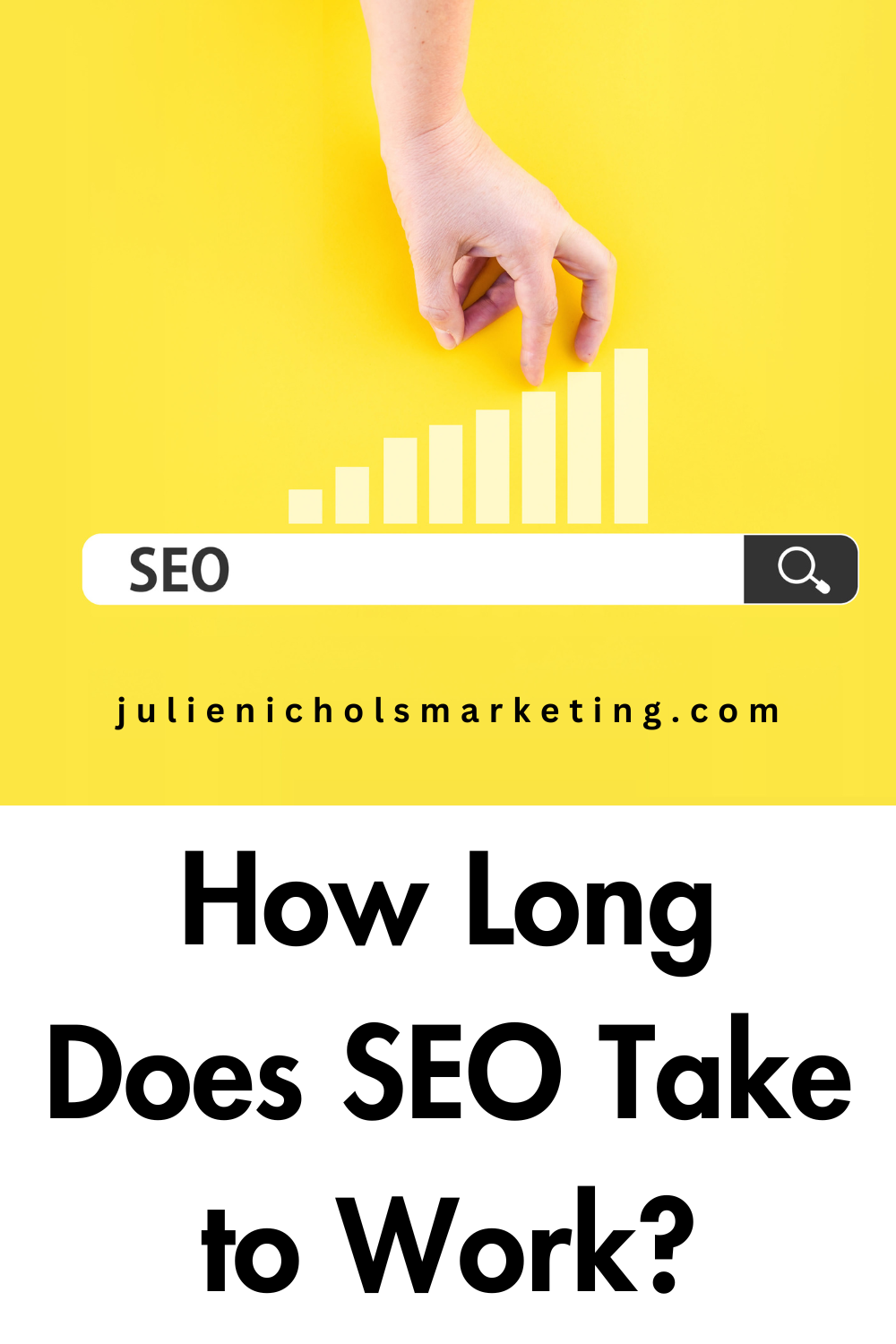How Long Does SEO Take to Work?
As a small business owner, navigating the complexities of digital marketing can feel overwhelming. But it doesn’t have to be! In this post, I’m breaking down SEO to help you learn how to make it work for your website.
Want to listen to this topic instead of reading it? Download my podcast episode, which is all about SEO for small business websites.
“When will my SEO start working?” on Apple Podcasts
“How long does it take to see SEO results?” on YouTube
Understanding SEO
SEO, or Search Engine Optimization, is the practice of enhancing your website and online content to be more visible and attractive to search engines like Google and Bing. The goal is to rank higher in search results for keywords related to your business, making it easier for potential customers to find you.
The Misconceptions and Realities
One of the biggest misconceptions about SEO is that it's a thing of the past, especially with the rise of AI tools like ChatGPT. While AI can indeed provide answers quickly, people still turn to search engines for many reasons. SEO is far from dead. It remains a crucial element of digital marketing, helping businesses reach a wider audience.
Writing for Humans First
A critical point is the importance of writing for humans first, rather than solely focusing on search engines. Quality content that engages and informs your audience will naturally attract more traffic and improve your SEO. Search engines favor content that is valuable to readers, so it's essential to create posts that resonate with your target audience.
Avoiding Common SEO Mistakes
Several SEO practices, often referred to as "black hat" techniques, should be avoided. These include keyword stuffing (overloading your content with keywords), using invisible text (hiding keywords within the content), and duplicating content from other sources. These practices can lead to search engine penalties, negatively impacting your rankings.
Instead, focus on creating original, high-quality content. Vary your keywords naturally within your posts and ensure your content is relevant and useful to your readers.
Leveraging AI in Your SEO Strategy
AI can be valuable in your SEO toolkit, but it should be used wisely. I recommend using AI for research and content planning. AI can help generate outlines, suggest topics, and provide keyword ideas, but the final content should always be crafted with a human touch.
Tools to Determine Ideal Keywords
Tools like AnswerThePublic.com and SEMrush can help you identify trending topics and keywords relevant to your industry. Use these insights to create content that addresses your audience's questions and needs.
The Importance of On-Page and Off-Page SEO
SEO can be divided into two main categories: on-page and off-page SEO.
On-Page SEO
On-page SEO refers to optimizing your website's content and structure. This includes using appropriate keywords, creating compelling meta tags, and ensuring your site is easy to navigate. Regularly updating your content and optimizing your blog posts for search engines are key aspects of on-page SEO.
Off-Page SEO
Off-page SEO involves activities outside your website that impact your rankings. This includes building backlinks from reputable sites, engaging in social media marketing, and creating a strong online presence. Collaborating with other businesses and influencers in your industry can also enhance your off-page SEO.
If your business wants to quickly rise in search rankings, you will need to invest in commercial SEO. Commercial SEO focuses on optimizing websites for businesses to increase their visibility, attract more potential customers, and ultimately drive sales and revenue. This type of SEO is particularly important for e-commerce sites, online retailers, and businesses that rely heavily on their online presence for sales.
Many companies pay top dollar to get their websites prioritized for search engine crawling. This means that search engine bots, like Google's web crawlers, will visit and index your site faster and more frequently.
How Long Does SEO Take to Show Results?
A common question among business owners is, "How long does it take for SEO to start working?" The answer depends on several factors, including the competitiveness of your keywords and the quality of your SEO efforts.
Short-Term vs. Long-Term SEO
SEO is a long-term strategy. While you may see some initial results within a few months, it often takes six to eight months, or even longer, to see significant improvements in your rankings. It's important to be patient and consistent with your SEO efforts.
Monitoring and Adjusting Your Strategy
SEO is not a set-it-and-forget-it task. Regularly monitor your website's performance using tools like Google Analytics and SEMrush. Pay attention to your rankings, traffic, and user engagement. If you notice fluctuations, it could be due to algorithm updates or changes in user behavior. Adjust your strategy as needed to stay on top of these changes.
Practical Tips for Improving Your SEO
Here are some practical steps you can take to improve your SEO:
Create High-Quality Content
Focus on producing valuable, informative content that addresses the needs and questions of your audience.
Optimize Your Blog Posts
Use relevant keywords in your titles, headers, and throughout your content. Ensure your posts are well-structured and easy to read.
Build Backlinks
Collaborate with other websites and influencers to build high-quality backlinks to your site. Also, you should link to relevant places within your website. For example, link a blog post about a service you offer to your Services page. This helps search engines better understand the structure of your site.
Use Social Media
Promote your content on social media platforms to increase visibility and drive traffic to your site. Post on a regular basis and periodically remind your followers to visit your website. You’d be surprised at how much traffic this drives!
Update Old Content
Review and update your existing content regularly to keep it fresh and relevant. Adding new information and improving the quality of your posts can boost your rankings.
SEO is a vital component of your digital marketing strategy. By understanding its importance, avoiding common mistakes, and leveraging AI wisely, you can enhance your online presence and attract more customers. Remember, SEO is a long-term investment, and patience is key. Keep creating valuable content, monitor your progress, and adjust your strategy as needed. With time and effort, your SEO efforts will pay off, helping your business grow and thrive.
Read another blog about SEO: Blog Post Checklist - Optimizing On-Page SEO
Want to get an email when a new blog is up? Subscribe for free today


